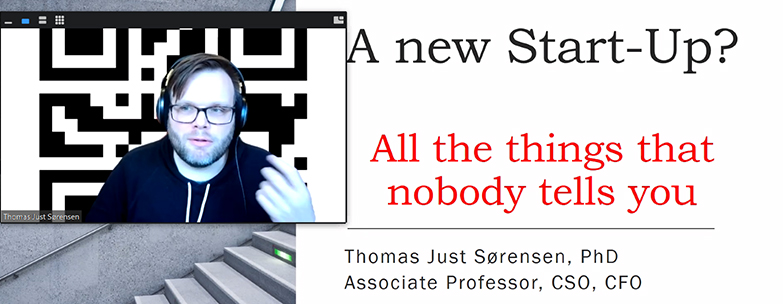Start-up tips from veteran founders at Brew Your Own
Networking is king, you need to know more about your co-founders than about your spouse, start-up handbooks forget to mention the red tape and your company name is a lot more important than you might think. These were among the key take-home-messages at the March 25th event “Brew Your Own: Start-up ABC” hosted by Copenhagen Science City in collaboration with Danish Life Science Cluster. The event coincided with the launch of a new web-resource for deep-tech founders.
Storytelling is a crucial start-up skill
After advising well over a thousand start-ups, Lasse Sørensen has reached a conclusion. The most important start-up skill is the ability to explain your business to other people. Sørensen is a Senior Business Consultant at Copenhagen Business Hub and he has seen too many founders loose too much time theorizing back at the office.
You need to get out and ask customers what they really want from you, tell potential co-founders why they should join you and explain to investors how your solution will solve important problems. For this, you need to be able to tell a great story about your passion, your skill and your vision. You also need the courage to boast about your achievements. It’s ok to point to your medals”. Lasse Sørensen, Senior Business Consultant, Copenhagen Business Hub.
Discuss the divorce before you get married
No one should ever found a start-up alone. Teams with contrasting skills have a much better chance of making it. Claudia Blomgren-Hansen advises team-members to have a very thorough discussion before going into business. Claudia Blomgren-Hansen is a Partner with the law firm LIFE SCIENCE PLUS Advokater. She recommends that co-founders draw up a shareholders agreement even though it is not mandatory.
It is really a bit like discussing the divorce before you get married. Co-founders should have a transparent discussion about their goals and objectives. About how much time, money and commitment they are prepared to put into it. About whether they are in it for a fast exit or the long haul and about what happens when someone wants to leave”: Claudia Blomgren-Hansen, Partner, LIFE SCIENCE PLUS Advokater.
Three months to get a bank account
Ideas based on fundamental research can take decades to mature into something marketable. This came as no great surprise to Thomas Just Sørensen. What did surprise the serial founder was the fourteen weeks and 25 individual bureaucratic interactions he needed to perform from the moment he decided to establish a company until he could get access to a fully functional bank account. In his day-job, Just Sørensen is an associate professor in chemistry at the University of Copenhagen. So far, he has based four companies on his own research.
My best advice for a deep-tech founder is this: If it is at all possible, you should team up with a CEO who has tried it all before. As a researcher, you may have what it takes to figure out who your customer is, and how to sell to them. It is much more difficult to find useful advice about dealing with all the nitty gritty details. Decisions about web-domains, holding companies, CVR-documentation, Nem-ID, accounting systems, salary systems and payment providers are just some of the red tape you need to go through, before you can even claim to be open for business”: Thomas Just Sørensen, professor, University of Copenhagen and Founder of Pufin ID, KU-Dyes, FRS-Systems and Tukan ID.
A name that allows you to grow
To someone with a killer idea based on really cool research, the name of the company may seem like a minor detail. Petros Venetopoulos and his co-founder wanted to provide fast and affordable analytical instruments to the craft beer industry, so they named their company BIR-Analyzers. It did not take the founders long to realize, that all other fermentation processes could also benefit from their IOT-based technology, but somehow they were stuck with a company name that just suggested beer.
We wanted a new name, which evoked fermentation, technology, data-analysis, tracking and science. It turns out, that there is a word, Zymoscope, for an instrument measuring the fermentation efficiency of yeast. However, there is no such instrument. After making sure, that we could buy the domain-name, we snapped up this new name for our start-up”: Petros Venetopoulos, Co-founder and CEO, Zymoscope.
Information, inspiration and motivation
Brew Your Own-events are co-created by Copenhagen Science City and Danish Life Science Cluster. The events aim to provide information, inspiration and an opportunity to network. The hope is to strengthen bonds between researchers and students who dream of starting a business or working for start-ups and founders who have already realized the dream.
Free services for the deeptech business beginner
Denmark is one of the best places in the world to build a start-up. There are a number of reasons for this. One reason is that founders can find free-of-charge information and advice for almost every step of the way from brainwave to unicorn. The Copenhagen Science City start-up ABC is the first place to collect all the relevant information in one place, in English for non-Danish researchers, students and potential founders and with only free services listed.




